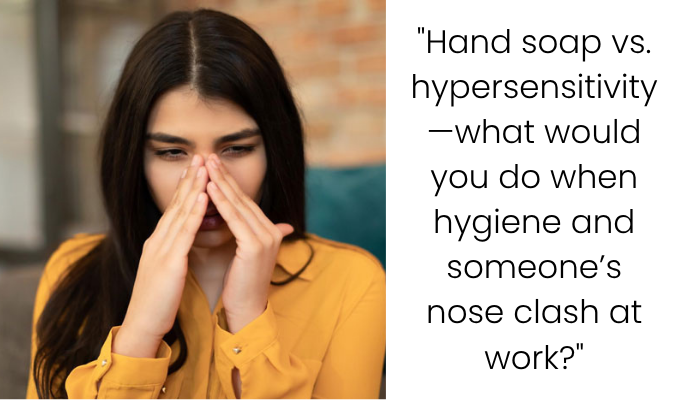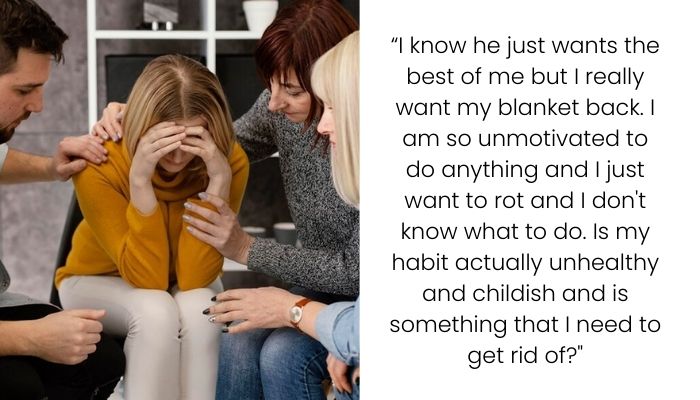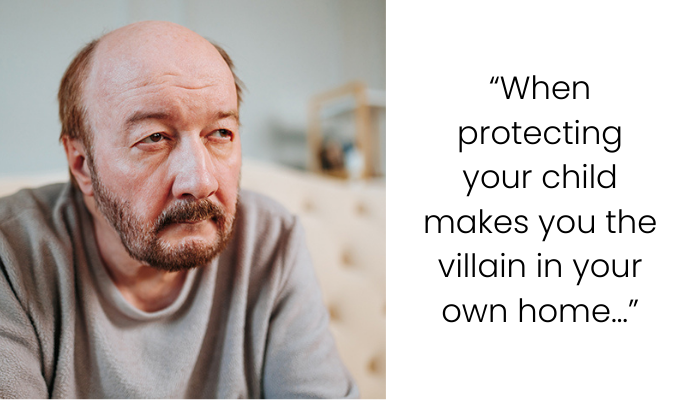Paranoid Woman Freaks Out Over Scents at Work, Reports Coworker for Using Soap to Wash Hands
Imagine being told your basic hygiene routine is too offensive for the workplace. That’s exactly the situation this employee found himself in. His coworker claims to be “sensitive to smells” and has been cracking down on anything scented in the office—from deodorant to perfume to apparently… soap.
After weeks of her passive-aggressively sniffing everyone’s workspace and demanding an end to mystery “perfume smells,” she finally singled him out. But what she smelled? It was just regular hand soap from the bathroom. And that was the last straw. He snapped, told her off professionally (with a sprinkle of sass), and now he’s waiting to see if he’s in trouble for it.
Was it an overreaction—or just someone standing up for common sense and cleanliness?
Offices need to make accommodations for people’s health conditions, but it should not be at the cost of other workers’ safety, productivity, or comfort

The poster shared that her coworker was so sensitive to smells that their office had to become a “scent-free zone,” but this eventually led to more problems








Alright, let’s get straight to it: you’re not the a-hole here. You’re just someone trying to stay clean and keep your hands bacteria-free. The fact that this has turned into a whole workplace drama is honestly wild.
Let’s break this down because there’s a lot going on here—scent sensitivity in the workplace, basic hygiene rights, and what HR can and can’t reasonably enforce when coworkers start playing smell detective.
So first: yes, some people genuinely have scent sensitivities. It’s a real thing. There are conditions like Multiple Chemical Sensitivity (MCS) or hyperosmia, where people are super sensitive to smells and can experience headaches, nausea, or even respiratory symptoms from fragrances. And companies are more aware of this now, which is why a lot of workplaces have fragrance-free policies.
That said—there’s a massive difference between managing a legit health condition and micromanaging everyone’s hygiene. You’re using soap. Not bathing in cologne. Not spraying Axe body spray in the cubicle. Just… washing your hands. That’s not just normal—it’s expected.
And let’s talk about that soap. If it’s standard hand soap provided by the building or you brought a generic one from home, that’s not on you. Most public soap has some fragrance. It’s not like you’re lathering up with designer perfume. Expecting coworkers to not wash their hands or switch to unscented everything just to accommodate one person’s ultra-sensitive nose? That’s unreasonable. Basic hygiene is not optional.
Now onto the coworker. Her whole “sniff everyone’s desk” routine? That’s not only invasive, it’s borderline harassment. Imagine someone sticking their face into your space every few days and taking a huge sniff. It’s weird. It’s disruptive. And honestly? That behavior should be the one HR is reviewing—not the soap.
It’s giving scent patrol energy, and that’s not a job title anyone asked for.

Now let’s touch on emotional labor and workplace boundaries. You’ve got your own tasks, your own stress. And now you’re being dragged into a bizarre scent witch hunt just for practicing basic hygiene. That’s exhausting and totally unnecessary.
You didn’t lash out. You kept it professional (with a healthy amount of frustration), and what you said was totally valid:
“Hand washing with soap is a non-negotiable hygiene practice, and I will not stop doing it.”
That’s not rude. That’s setting a boundary. And boundaries are important in any workplace.
Now let’s talk HR—because let’s be real, you’re probably getting pulled into a meeting this week. Here’s the good news: you have nothing to hide and everything to stand on. If this does go to HR, here’s how to frame it:
- Be clear: “I only used standard soap from the bathroom and followed normal hygiene practices.”
- Be calm: “I understand she has sensitivities, but I believe asking me not to wash my hands with soap is unreasonable.”
- Be proactive: “If this is going to be an ongoing concern, maybe the company can explore unscented soap in the bathroom instead of expecting individual employees to change personal routines.”
You come off as reasonable. She comes off as disruptive.
Here’s another angle: what happens if people do stop washing their hands because they’re afraid of setting off a scent alarm? That’s a literal health hazard. The CDC and every health organization out there stresses the importance of regular handwashing, especially in shared workspaces. Your coworker’s “no soap” request? That’s not just impractical—it’s potentially dangerous during flu season or a pandemic.
Let’s also talk about company policy. If your company has a fragrance-free policy, great. That typically applies to voluntary fragrance use—perfumes, colognes, scented lotions. It does not usually extend to necessary hygiene products like hand soap unless there’s a pre-approved accommodation in place (with medical documentation). So unless HR specifically says, “Only use scent-free soap provided in this specific dispenser,” you’re in the clear.

And lastly: let’s not ignore the emotional toll of this. You’re now dreading Monday because of soap. That’s not okay. Work should be a place where people can focus, not feel anxious because a coworker might go full smell-police over hygiene. That kind of stress adds up. It impacts morale, productivity, and even mental health. And it’s not your fault.
If your boss or HR asks, stay factual. Don’t insult her. Don’t speculate on whether she’s faking or exaggerating. Just stick to:
- “I used soap.”
- “I didn’t apply perfume or scented products.”
- “I was respectful until I was singled out unfairly.”
And if they try to push the issue, ask them:
“Are we being asked to stop washing our hands with standard soap due to someone’s individual sensitivity? If so, can you clarify the policy going forward?”
That puts the ball in their court, and it makes them actually think about the long-term effects of such a request.
Folks were shocked by the sensitive colleague’s behavior and felt that she probably never washed her hands, which is why she hadn’t smelled the hand wash earlier








You’re not an a-hole for refusing to compromise your hygiene over someone’s overly aggressive scent policing. You’re allowed to wash your hands. You’re allowed to set boundaries. And most of all—you’re allowed to not feel guilty about it.







